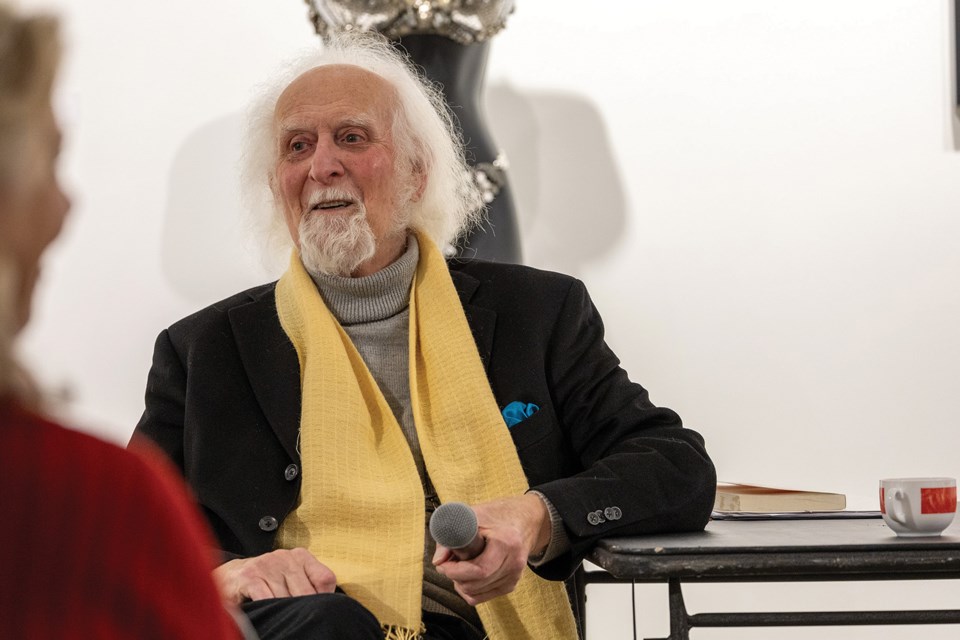One of Canada’s foremost cultural commentators issued a rousing call to action during a public lecture in Gibsons last week.
After emigrating to Canada in 1967, Max Wyman served as an arts columnist and critic for the Vancouver Sun, Province, and CBC Radio for 30 years. In 2023 Wyman published his seventh book, The Compassionate Imagination: How the arts are central to a functioning democracy.
“None of our leaders seem able or willing to grasp the central nettle, which is to stop seeing the arts sector as a frill, as an outlier,” said Wyman, “and to see it [instead] as a central contributor to the quality and richness of our lives together.”
Wyman spoke to a crowded room at the Gibsons Public Art Gallery on Feb. 29. The event was sponsored by the Sunshine Coast Writers and Editors Society and hosted by local author Jan Degrass. Audience members represented an ample cross-section of the Coast’s literary community.
Wyman referred to his years spent on the board of the Canada Council for the Arts, during which he interrogated politicians about the best way to frame arguments for more financial support of the arts in Canada.
“Make it about jobs and the economy,” he was told repeatedly. The lesson was clear: Canada values accountability, even if it’s tricky to distill the value of arts and culture into a spreadsheet.
The result, he said, is that the arts community became adept at demonstrating how it generates dividends and spin-off effects — including work for people in other sectors like the hospitality industry. The cultural sector’s financial contributions are undeniable, he stressed, quoting studies that show more people attend arts events than sports events by a significant margin.
Nevertheless, the era of expressing culture’s value in fiscal terms must come to an end, argued Wyman. “It’s time for the cultural sector to abandon this litany of neediness, to stand up tall and start arguing for real social strength. Not ‘help us, please,’ but ‘please let us help.’”
Wyman’s book outlines his proposal for a new Canadian cultural contract between the government of Canada and its citizens. His scheme would involve integrating creative people into policy-making bodies across the country. It would reposition the arts to a central place in the educational curriculum, complementing science, technology, engineering and math. He envisions more concrete involvement of Indigenous cultural leaders and Indigenous ways of knowing in civic decision-making. Finally, he zeroed in on new technology as a channel to enable all Canadians to gain access to the country’s cultural riches.
“We’re all victims of geography in this country,” he said. “The National Arts Centre [in Ottawa] has never really lived up to its name. I’m proposing that we take advantage of wonderful new technologies to set up a national [video] streaming service that will show the full range of Canadian creativity: dance, theatre, writing. All free.”
He also proposes a personal cultural credit for every individual in Canada, a sum that could be spent on anything related to arts or culture.
Attendees pressed Wyman on the first steps in realizing his plan. Start with those in your social circle, he recommended. “Establish a point of connection,” he said. “Talk about a TV show you both looked at. Suggest going to a play with them. You might want to share a book. We’ve lived too long inside the cultural glasshouse. The arts belong to everybody and not enough people know that.”
Wyman’s book is available for purchase at Sunshine Coast booksellers and online retailers.



